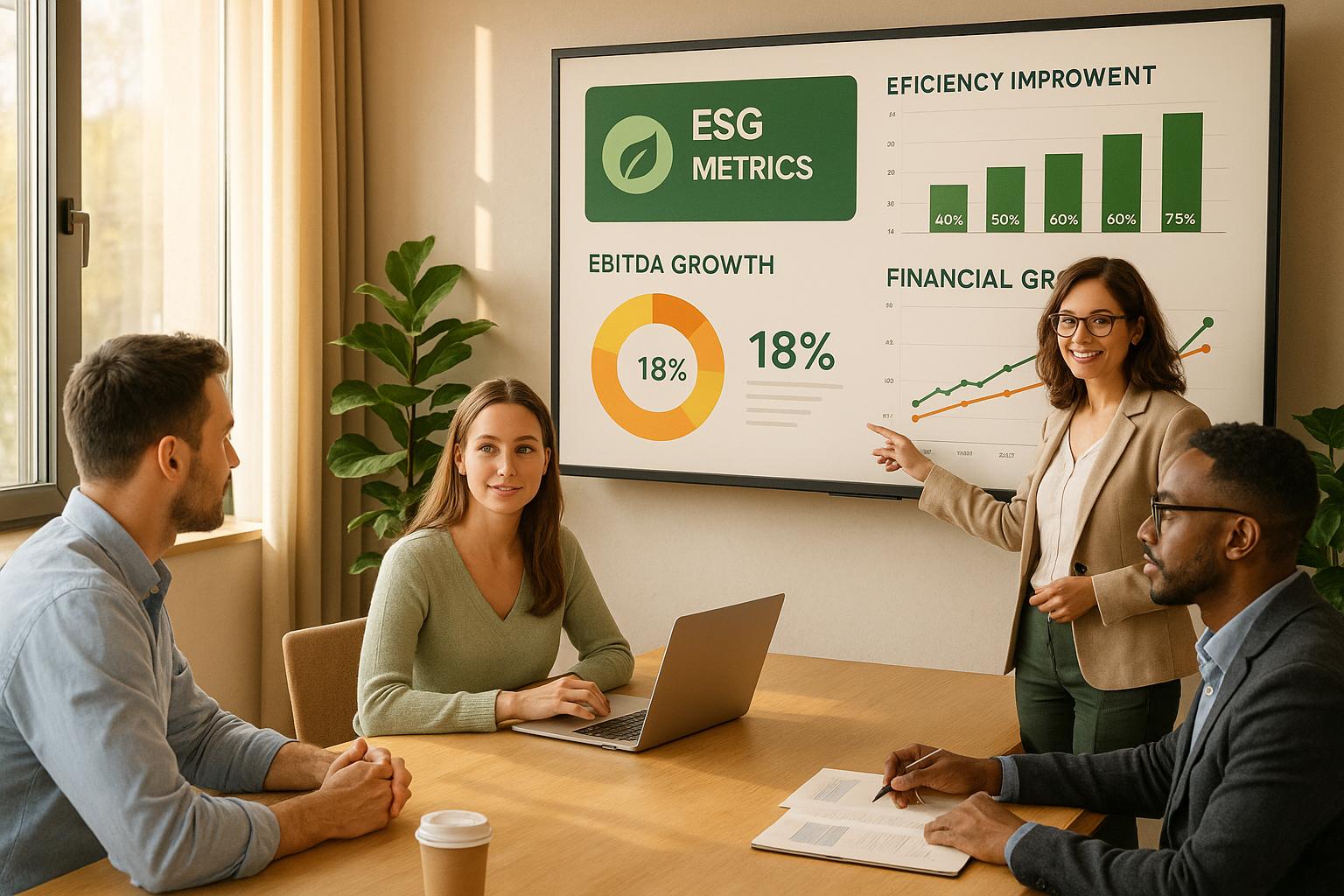VSME Standard: The Simplified Sustainability Reporting Solution for EU SMEs
Sustainability reports are more important than ever for German SMEs. With the new VSME standard,...
By: Johannes Fiegenbaum on 6/23/25 3:04 PM

How can European companies increase their EBITDA while also achieving ESG goals? The answer: VSME (Voluntary SME Standard) – a lean standard developed specifically for SMEs, offering a practical pathway to sustainable growth and profitability in a rapidly evolving regulatory landscape.
Why VSME? It offers SMEs a simple, flexible solution to meet ESG requirements, cut costs, and improve financial performance. Learn more about VSME and sustainability reporting.
VSME (Voluntary Standard for non-listed Small- and Medium-sized Enterprises) is a voluntary standard developed specifically for non-listed small and medium-sized enterprises (SMEs). Initiated by the European Financial Reporting Advisory Group (EFRAG), its goal is to provide SMEs with a clear, actionable structure for managing and reporting sustainability information. See how ESRS and CSRD relate to VSME.
The VSME standard consists of three modules: a basic module with around 50 data points, a narrative module for policies, actions, and targets, and a business partner module with about 100 additional points. These can be flexibly combined, allowing SMEs to tailor their approach without unnecessary complexity or administrative overload.
VSME is closely linked to the Corporate Sustainability Reporting Directive (CSRD) and was tailored specifically to the needs of SMEs. The standard defines which sustainability information CSRD-obligated companies may request from their non-reporting suppliers, a mechanism often referred to as the “Value-Chain Cap.”
Thanks to the EU Omnibus Regulation, SMEs are directly exempt from CSRD reporting, significantly reducing administrative burden. However, the pressure from business partners and larger supply chain actors to demonstrate sustainable performance is mounting. Learn more about the EU Omnibus Regulation and its impact.
“In practice, this ‘trickle-down’ effect means that all companies in Europe must carefully collect and manage their non-financial data. Either because they are directly affected by regulation (CSRD & ESRS) or because their customers and other business partners will ask for it (VSME).” – Julia Staunig, Position Green
With VSME, SMEs can directly address key environmental and social challenges—such as environmental protection, occupational safety, and diversity. For example, German SMEs can use VSME to track CO₂ emissions, set reduction targets, and implement energy-saving measures, aligning with both regulatory expectations and market trends. This not only strengthens resilience and growth but also builds trust among customers, authorities, and partners, making it easier to integrate into ESG-compliant supply chains. These benefits enable SMEs to optimize their reporting and risk management, which positively impacts EBITDA. Explore climate risk assessment and management.
Implementing VSME streamlines ESG reporting for SMEs, freeing up resources to focus on value-adding activities—a key driver for improving EBITDA. The standard promotes operational efficiency and facilitates access to sustainable financing, as financial institutions increasingly favor companies with robust ESG credentials. According to the European Investment Bank, companies with strong ESG performance are more likely to secure favorable financing terms (EIB Investment Survey 2023).
Another advantage is the reduction of administrative effort. Unlike other standards that require a “double materiality analysis,” VSME uses a pragmatic “if applicable” approach, minimizing unnecessary workload.
The EU Omnibus Regulation aims to reduce administrative burdens by 25% for large companies and by as much as 35% for SMEs. This relief allows SMEs to focus more on strategic and value-creating activities, which directly impacts EBITDA performance.
Additionally, VSME opens access to green financing opportunities and increases the chances of winning public tenders with sustainability criteria. For example, the German government’s “Sustainable Finance Strategy” encourages public procurement to favor companies with credible ESG reporting (German Sustainable Finance Strategy). These measures not only contribute to financial performance but also promote more sustainable business development. Discover green financing and sustainable growth opportunities.
With VSME, companies can pinpoint inefficiencies in energy and water consumption and systematically address operational weaknesses. For instance, by benchmarking energy use and identifying outliers, SMEs can implement targeted efficiency measures—such as upgrading to LED lighting or optimizing production schedules. According to the International Energy Agency, such improvements can yield energy savings of up to 20% in manufacturing sectors. VSME makes management easier for SMEs, improves access to financing, and strengthens relationships with investors and customers. The standard also helps optimize sustainability goals and governance, aligning investment decisions within operations and supply chains more effectively. Alongside these efficiency gains, the standard significantly reduces costs through consistent waste reduction. Learn about reducing Scope 2 emissions and energy efficiency.
Germany is among the world’s leading countries in waste production, with 609 kilograms of waste per capita annually. At the same time, the country recycles an impressive 70% of its waste and has reduced annual waste by 900,000 tons through innovative recycling strategies (Statistisches Bundesamt). VSME leverages simulation methods to make production systems more efficient and minimize waste. Practical measures include sustainability audits, switching to recyclable materials in production, and introducing improved waste separation systems with additional recycling bins—actions that not only reduce environmental impact but also lower disposal costs and improve EBITDA.
VSME simplifies data collection for SMEs, enabling informed business decisions. With just 20 reporting points across two modules, VSME is much leaner than ESRS’s more than 1,000 data points (ESRS Integration). This streamlined approach allows SMEs to focus on the most material issues, ensuring that resources are allocated efficiently and investments are based on solid evidence.
“VSME reporting offers several advantages—it helps companies improve internal decision-making, meet growing stakeholder expectations, and optimize ESG data management. For companies that may need to comply with ESRS in the future, adopting VSME now ensures a smooth and structured transition.” – Frida Stolpe, Senior Associate, Position Green
By optimizing data collection processes, companies can use resources more efficiently and base investments on solid data, reducing the risk of costly missteps.
VSME helps companies identify and address key environmental and social risks. The standard makes it easier for SMEs to prepare for future reporting obligations and complements existing QHSE reports based on ISO standards, such as ISO 14001. This reduces the need for separate reporting systems and minimizes compliance risks, ensuring that companies are well-prepared for audits or stakeholder inquiries.
“Sustainability is no longer just a buzzword—it’s the backbone of a resilient business strategy.” – ESG Advisory Circle, Europe 2024
A structured sustainability strategy helps companies continuously improve their ESG performance while laying the foundation for greater employee engagement and motivation.
VSME fosters a corporate culture based on accountability and continuous improvement. Employees are actively involved in sustainability projects, and ESG goals are communicated transparently. Training on sustainable practices is a core part of VSME implementation. According to a Deloitte survey, companies with strong sustainability cultures report up to 16% higher employee engagement. Companies can start with smaller projects to achieve quick wins and strengthen workforce motivation over the long term. These measures not only boost employee engagement but also directly contribute to improved EBITDA.

ESG and sustainability consultant based in Hamburg, specialised in VSME reporting and climate risk analysis. Has supported 300+ projects for companies and financial institutions – from mid-sized firms to Commerzbank, UBS and Allianz.
More aboutSustainability reports are more important than ever for German SMEs. With the new VSME standard,...
Why Should Startups Take ESG Reporting Seriously?